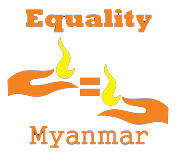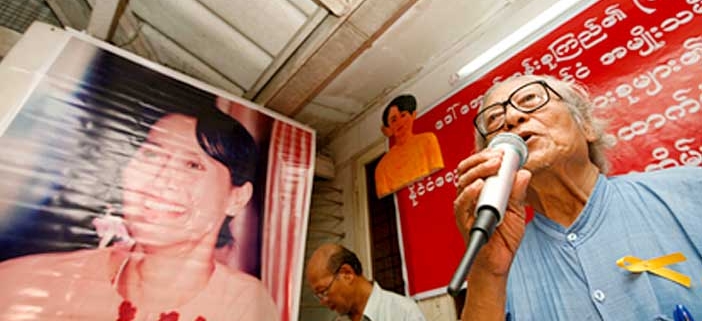MONDAY, 19 MARCH 2012
A group of prominent ex-political prisoners has called for more to be done to help former inmates adjust to their new lives outside of jail.
Renowned journalist Win Tin, human rights activist Bo Kyi and 88 Generation Students leader Ko Ko Gyi were among those voicing their concerns at the lack of support political prisoners receive after their release.
“People sometimes forget about political prisoners whose lives were destroyed,” said Win Tin, a former political prisoner and leading member of Aung San Suu Kyi’s National League for Democracy (NLD). “We want them not to be ‘forgotten political prisoners.’ It is not enough only to provide support in cash, but support so they are able to recreate their lives is also needed.”
“I think even one political prison detained is too much,” he added. “So we will keep trying for the release of the remaining political prisoners.”
Bo Kyi, co-founder of the Thailand-based Assistance Association for Political Prisoners (AAPP), said that there is a desperate need for former political prisoners to have access to rehabilitation programs. “As many were in prison for decades, they need to catch up with the social changes in society,” he said.
AAPP Secretary Tate Naing said that it is important for democratic transition that victims have justice, and suggested that the government should initiate this process. He added that the real need now is healing and rehabilitation for ex-political prisoners in term of education, health and social support.
“While the country is on the road to change, there should not be any political prisoners detained,” said Ko Ko Gyi. “The issue of freeing political prisoners is still significant for Burma moving towards the democratic path.”
Monday, March 12, was Win Tin’s 82nd birthday and also marked the launch of the Hanthawati U Win Tin Foundation to provide health, financial and moral support to political prisoners and their families.
Kyaw Aung, the coordinator of the Hanthawati U Win Tin Foundation, told The Irrawaddy that, “[The Foundation] provides financial support to five ex-political prisoners who are in bad health and three family members who cannot afford to go and see their loved ones.”
Meanwhile, The List Verification Committee of the Rangoon-based Formers Political Prisoners Group presented a list of 619 remaining political prisoners’ names to US Special Envoy to Burma Derek Mitchell during his sixth visit to the military-dominated Southeast Asian nation last week.
Hnin Hnin Hmway told The Irrawaddy that they took the list of persons still detained in 41 prisons across Burma from figures obtained from the AAPP and the NLD. There have reportedly been more than one hundred thousand political prisoners detained in Burma since pro-democracy demonstrations were crushed in 1988.
Apart from the horrific treatment political prisoners receive during their detention, many have found it impossible to get a job or return to normal life after their release. Lawyers are not allowed to return to practice and many companies are afraid of losing lucrative contracts or facing penalties for hiring ex-political prisoners.
Although there are a handful of ex-political prisoners who are in the political arena, “it is not easy for most of them to go back to their political lives and be productive members of their communities after being in prison for many years,” said Aung Zaw Htun, who is coordinator of the Network for Family Members of Political Prisoners in Rangoon.
Some may get involves in politics, those from rural areas usually return to their families, while young people sometimes return to their studies or take part in work for NGOs or as journalists. However, “the proportion is relatively low at around 30 percent of the total,” he said.


 Equality Myanmar (EQMM) is a leading nongovernmental organization that organises a wide range of human rights education and advocacy programs, the documentation human rights violations, and provides emergency support for activists, human rights defenders, and their families. We work with a range of local civil society organizations, educators, activists, various local actors, and our programs and activities reach all states and regions in Myanmar.
Equality Myanmar (EQMM) is a leading nongovernmental organization that organises a wide range of human rights education and advocacy programs, the documentation human rights violations, and provides emergency support for activists, human rights defenders, and their families. We work with a range of local civil society organizations, educators, activists, various local actors, and our programs and activities reach all states and regions in Myanmar.
